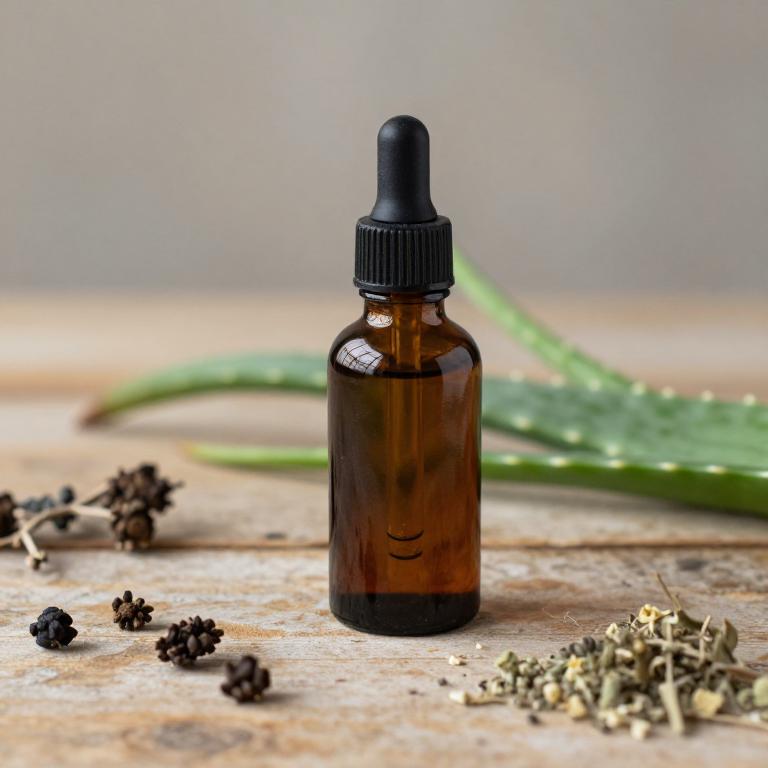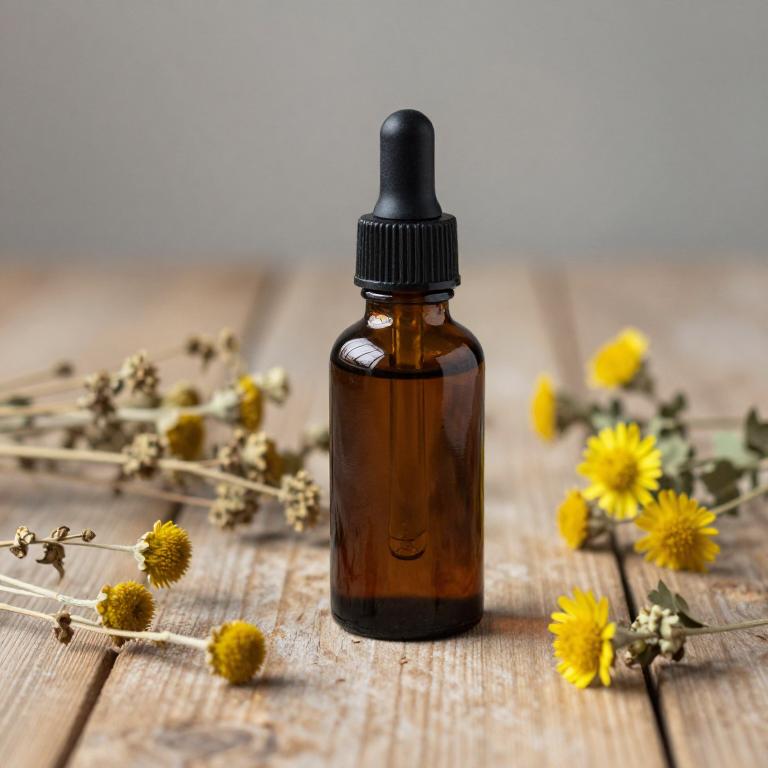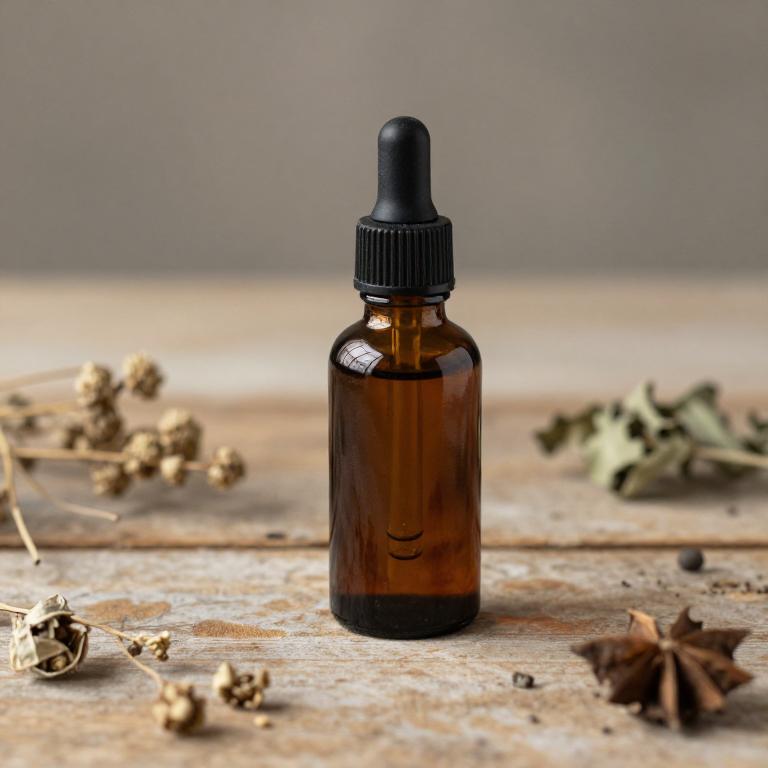10 Best Herbal Tinctures For Oily Skin

Herbal tinctures are concentrated liquid extracts made from plants, often used in skincare for their natural healing properties.
For oily skin, tinctures containing ingredients like chamomile, calendula, and sage can help regulate sebum production and reduce excess oiliness. These herbal formulations are typically alcohol-based, which can help dissolve impurities and provide astringent effects. They are a popular alternative to synthetic acne treatments, offering a gentler and more holistic approach to skincare.
Regular use of herbal tinctures can improve skin clarity and balance, making them a valuable addition to a skincare routine for those with oily skin types.
Table of Contents
- 1. Aloe vera (Aloe barbadensis)
- 2. St. john's wort (Hypericum perforatum)
- 3. German chamomile (Chamomilla recutita)
- 4. Marigold (Calendula officinalis)
- 5. Rosemary (Rosmarinus officinalis)
- 6. Salvia (Salvia officinalis)
- 7. Echinacea (Echinacea purpurea)
- 8. Ginger (Zingiber officinale)
- 9. Chaste tree (Vitex agnus-castus)
- 10. Centella (Centella asiatica)
1. Aloe vera (Aloe barbadensis)

Aloe barbadensis herbal tinctures are widely used for their soothing and hydrating properties, making them particularly beneficial for individuals with oily skin.
These tinctures contain a concentrated form of aloe vera, which is known for its ability to regulate sebum production and reduce excess oiliness on the skin's surface. The anti-inflammatory and antimicrobial properties of aloe help to calm redness and prevent breakouts, common concerns for those with oily skin types. Additionally, aloe tinctures can help balance the skin's pH, promoting a clearer and more even complexion over time.
When applied topically, they offer a natural and gentle alternative to harsh chemical treatments, supporting long-term skin health without clogging pores.
2. St. john's wort (Hypericum perforatum)

Hypericum perforatum, commonly known as St. John's Wort, is a herbal tincture that has been traditionally used for its anti-inflammatory and skin-soothing properties.
When used for oily skin, it can help regulate sebum production and reduce excess oiliness without stripping the skin of its natural moisture. The tincture contains compounds like hyperforin and flavonoids that may help balance the skin's oil glands and reduce the appearance of blemishes. It is often recommended as a natural alternative to synthetic acne treatments, especially for those seeking gentle, plant-based skincare solutions.
However, it is important to consult with a healthcare provider before use, as it can interact with certain medications and may cause photosensitivity.
3. German chamomile (Chamomilla recutita)

Chamomilla recutita herbal tinctures are derived from the flowers of the German chamomile plant, known for their calming and anti-inflammatory properties.
These tinctures are particularly beneficial for oily skin due to their ability to regulate sebum production and reduce excess oiliness. The active compounds, such as bisabolol and flavonoids, help soothe skin irritation and prevent breakouts, making them ideal for acne-prone or sensitive skin types. When used topically, chamomile tinctures can also provide a gentle, natural alternative to harsh chemical treatments.
Regular application may help improve overall skin texture and promote a more balanced, healthy complexion.
4. Marigold (Calendula officinalis)

Calendula officinalis herbal tinctures are derived from the dried flowers of the calendula plant, known for their soothing and anti-inflammatory properties.
These tinctures are particularly beneficial for oily skin due to their ability to regulate sebum production and reduce excess oiliness. The active compounds in calendula, such as flavonoids and triterpenes, help to calm redness and irritation while promoting a balanced complexion. When applied topically, calendula tinctures can also help to unclog pores and prevent breakouts, making them a valuable addition to a skincare routine for those with oily skin types.
Overall, calendula officinalis tinctures offer a natural and effective way to maintain clear, healthy skin without the use of harsh chemicals.
5. Rosemary (Rosmarinus officinalis)

Rosmarinus officinalis, commonly known as rosemary, is a popular herb used in the formulation of tinctures for oily skin due to its astringent and antioxidant properties.
These tinctures help regulate sebum production, reducing excess oiliness and preventing breakouts. The essential oils in rosemary tinctures, such as camphor and cineole, have antimicrobial effects that combat acne-causing bacteria on the skin. Additionally, they promote circulation and can help reduce the appearance of pores, leaving the skin feeling refreshed and balanced.
When used consistently, rosemary tinctures can be a natural and effective addition to a skincare routine for those with oily or acne-prone skin.
6. Salvia (Salvia officinalis)

Salvia officinalis, commonly known as sage, is a popular herbal plant used in the formulation of tinctures for its potent skin-soothing properties.
These tinctures are particularly beneficial for individuals with oily skin, as they help regulate sebum production and reduce excess oiliness. Sage contains compounds like rosmarinic acid and flavonoids, which have anti-inflammatory and antimicrobial effects, making them effective in preventing breakouts and calming irritated skin. The astringent properties of sage tinctures can also help tighten pores and improve skin texture, contributing to a more balanced complexion.
When used consistently, sage tinctures offer a natural and gentle alternative to conventional skincare products for managing oily skin concerns.
7. Echinacea (Echinacea purpurea)

Echinacea purpurea herbal tinctures are commonly used in natural skincare for their potential anti-inflammatory and immune-boosting properties.
These tinctures are particularly beneficial for individuals with oily skin, as they may help regulate sebum production and reduce excess oiliness. The active compounds in echinacea, such as alkamides and caffeic acid, are believed to support skin health by promoting a balanced complexion. When applied topically, echinacea tinctures can help soothe irritation and minimize the appearance of blemishes.
However, it is important to dilute the tincture properly before use to avoid skin irritation, especially for those with sensitive or oily skin types.
8. Ginger (Zingiber officinale)

Zingiber officinale, commonly known as ginger, is widely used in herbal tinctures for its potent anti-inflammatory and antioxidant properties, making it beneficial for oily skin.
These tinctures help regulate sebum production, which is often excessive in oily skin types, leading to reduced shine and fewer breakouts. The active compounds in ginger, such as gingerol and zingiberene, have been shown to soothe irritation and improve skin texture, promoting a clearer complexion. When applied topically, ginger tinctures can also enhance circulation, contributing to a more radiant and healthy-looking skin appearance.
However, it is important to dilute the tincture properly before use to avoid potential skin irritation, especially for those with sensitive skin.
9. Chaste tree (Vitex agnus-castus)

Vitex agnus-castus, also known as chasteberry, is a popular herbal tincture used to support hormonal balance, making it particularly beneficial for individuals with oily skin.
This herb is often recommended for women experiencing hormonal fluctuations that can lead to excess sebum production and acne. Its natural compounds may help regulate sebum glands, reducing oiliness and improving skin clarity. When used as a tincture, Vitex agnus-castus is typically taken orally, though topical applications are less common.
It is important to consult with a healthcare provider before starting any herbal regimen, especially if you have existing health conditions or are taking other medications.
10. Centella (Centella asiatica)

Centella asiatica, also known as gotu kola, is a traditional herb widely used in herbal tinctures for its soothing and skin-repairing properties.
These tinctures are particularly beneficial for oily skin due to their ability to regulate sebum production and reduce excess oiliness. The active compounds in Centella asiatica, such as asiatic acid and madecassic acid, help strengthen the skin's barrier and promote a more balanced complexion. Regular use of Centella asiatica tinctures can also help minimize the appearance of acne and redness, making them a popular choice in natural skincare routines.
Overall, these herbal tinctures offer a gentle yet effective way to manage oily skin while promoting long-term skin health.